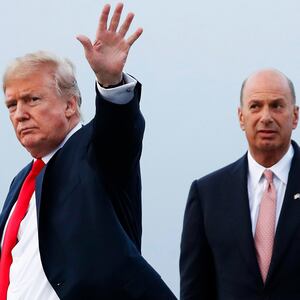The upcoming week on Capitol Hill will be defining for the impeachment inquiry. Eight witnesses will testify publicly over three days in what will be the second, and perhaps final, week of public impeachment hearings. Set to testify are several witnesses with firsthand knowledge of Trump’s July 25 call with President Zelensky, and their accounts will test Republicans’ central defense that the impeachment case is based on hearsay. The public will also hear from several officials who are poised to fill in key gaps in the story of exactly how and why security aid to Ukraine was held up as Trump sought to secure promises from the new government.
U.S. Ambassador to the E.U. Gordon Sondland is easily impeachment investigators’ most-wanted witness. After amending his initial testimony to say he simply presumed Trump sought investigations from Ukraine in exchange for security aid, a US embassy official in Kyiv testified that he heard Sondland on the phone with the president, who directly pressed him on the status of the plan. Lawmakers on both sides will likely have tough questions for the hotelier turned Trump-backing diplomat with a messy role at the center of this story.
Lt. Col. Alexander Vindman, a Soviet-born war hero, is one of the three people investigators will hear from who directly listened to Trump’s July 25 call with Zelensky. The former National Security Council official is expected to offer more details about that, and also to set the scene of a July 10 White House meeting in which Sondland connected “investigations” to favor with Trump for a visiting Ukrainian delegation; afterward, Vindman immediately notified the NSC’s top attorney.
Tim Morrison succeeded Fiona Hill as the top official for Ukraine issues at the National Security Council. He also listened to the July 25 call, and while Vindman found it troubling, Morrison told investigators in his closed-door deposition that he did not believe anything Trump raised was illegal. Republicans consider him one of their strongest witnesses and specifically requested his testimony; however, Democrats still believe he will confirm the key elements of their quid-pro-quo case.
Kurt Volker is the U.S. special envoy to Ukraine and one of the main participants in the so-called “irregular” Ukraine policy channel. A career diplomat, Volker is one of two witnesses to have had extensive contact with a number of key figures in the probe on both sides of the Atlantic. Democrats will look to him to reveal the nitty-gritty of how that outside channel worked to secure what Trump wanted out of Ukraine; Republicans will likely use him as a vehicle to distance the Ukraine matter from the president personally.
Jennifer Williams is a close adviser to Vice President Pence. She was in the room for Trump’s call with President Zelensky. She could provide more details about what conversations occurred in the room right before and right after the call. She’s also likely to provide additional information about Pence’s meeting with Zelensky in Warsaw in September and his other interactions with Ukrainian officials while there.
Fiona Hill, the National Security Council’s Russia expert until July, worked directly for John Bolton. Until or unless he testifies, Hill can provide a window into how Trump’s top national security adviser bristled at the Ukraine push. She also clashed with Sondland, telling investigators during her deposition that he declared to her that Trump put him “in charge” of Ukraine matters.
Laura Cooper, a Pentagon official with Russia and Ukraine issues in her portfolio, is expected to dive into the timeline of the stalled Ukraine security aid and how the relevant agencies were left in the dark as to what was going on. As Republicans turn to an argument that Trump simply held up the aid until he was convinced Zelensky was trustworthy, Cooper is poised to offer a persuasive counter: her agency’s experts had already made that determination.
David Hale, the under secretary of state for political affairs , could offer more details about Pompeo’s knowledge of not only the reason behind Marie Yovanovitch’s ousting but also what the secretary knew of the hold up of military aid. He reportedly told investigators that Secretary of State Mike Pompeo determined that publicly defending former Ambassador Yovanovitch could prevent the flow of U.S. military aid to Ukraine.







